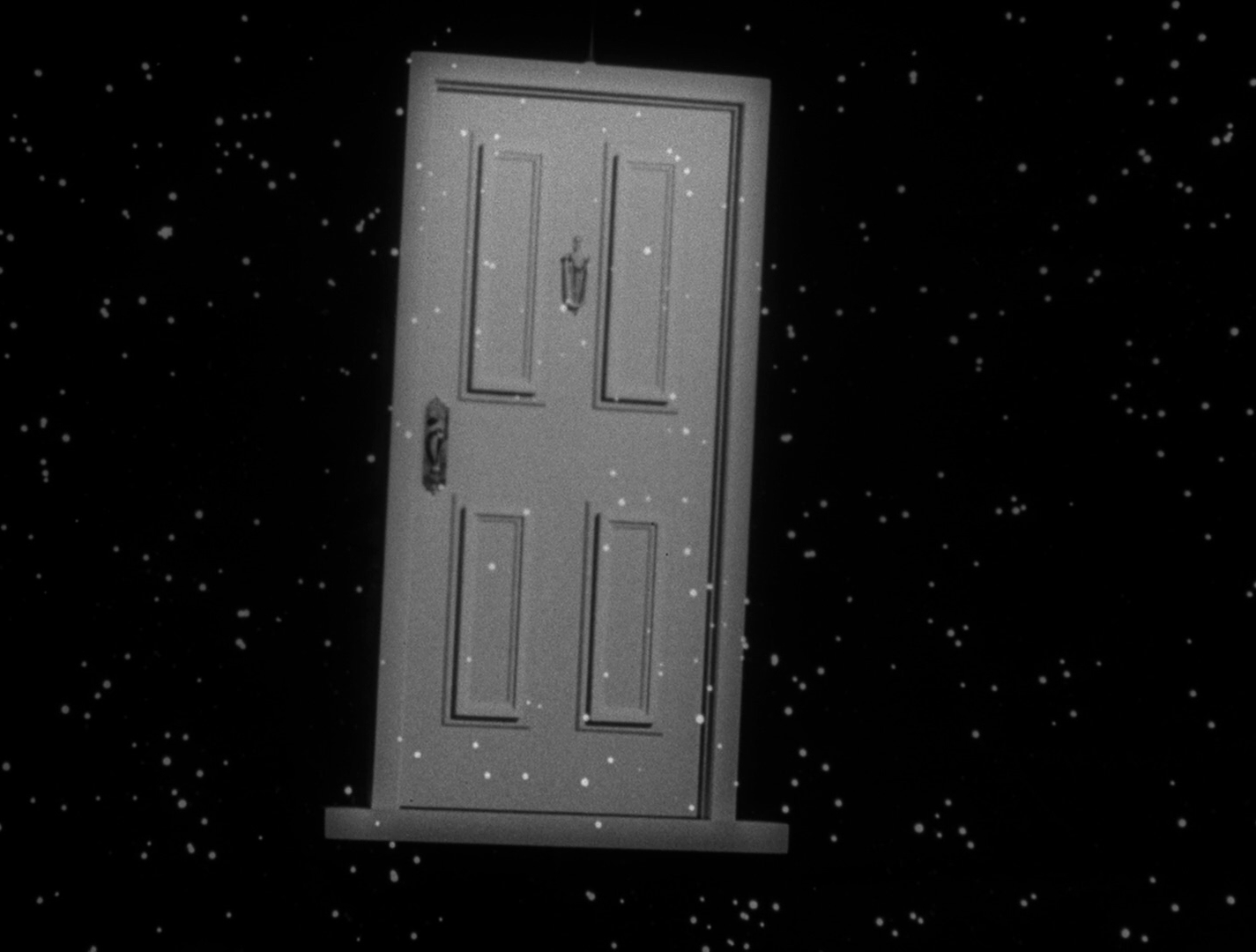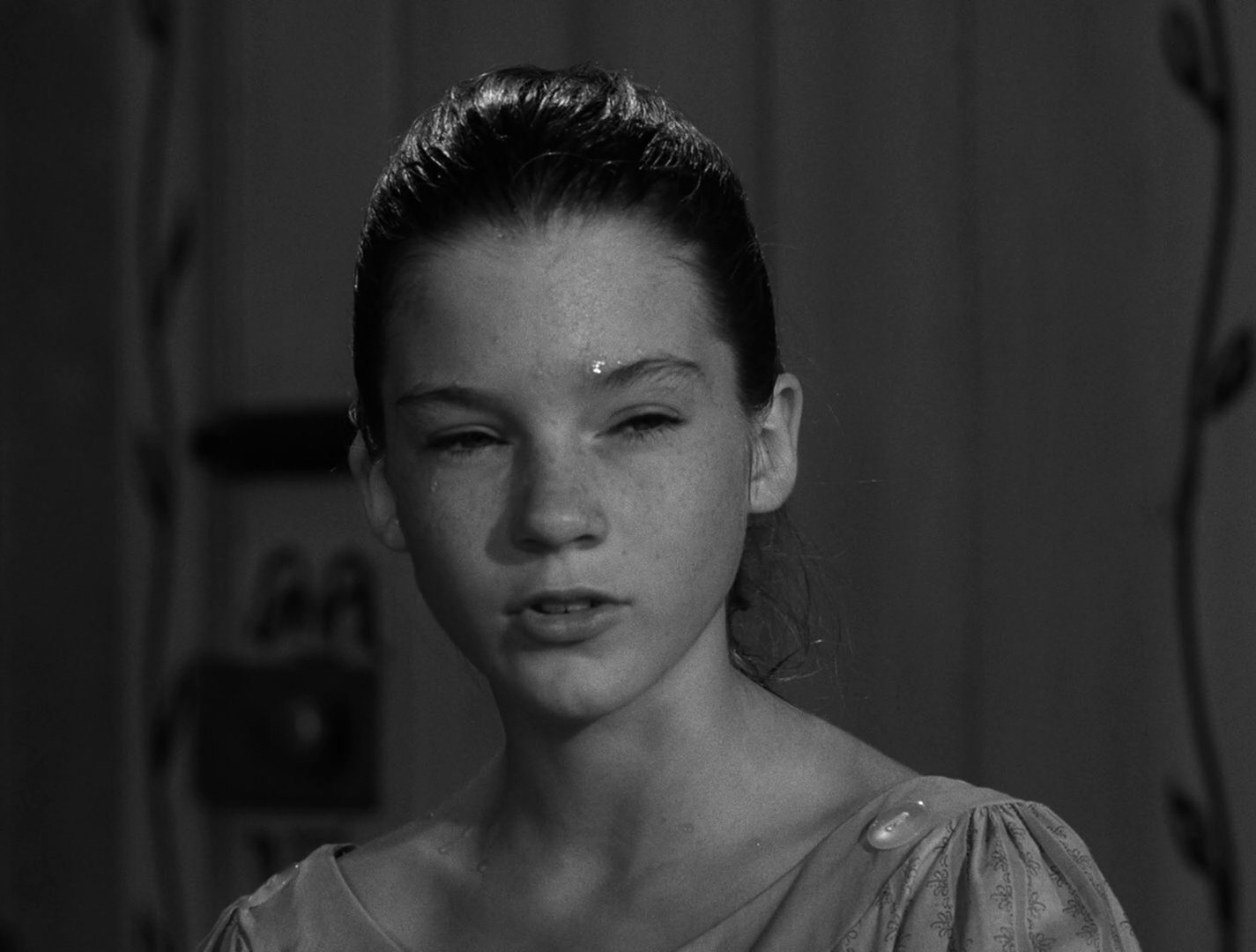Season 5, Episode 36 (156 overall)
Originally aired 6/19/1964
Cayuga Production # 2619
Fifty years ago tonight, a television
legend came to an end as The Twilight
Zone aired its 156th and final episode. Sadly, the series ended with a soft, weak
whimper instead of going out with a powerful, brilliant bang.
The Sharewoods are an unhappy bunch.
Gil and Gloria have two modes of interaction: passive aggression and just plain
aggression, and siblings Sport and Jeb are constantly caught in the crossfire.
One day a young boy named Whit appears out of nowhere in their swimming pool
and invites them to come with him. They dive in after him, and emerge in a
lake.

There’s a charming cottage on the
lake’s shore, and several children are playing in the yard. Whitt introduces Sport
and Jeb to Aunt T, an elderly woman who explains that her home is a sanctuary
of sorts for sad and neglected children. Sport insists that they aren’t
neglected; that their parents do in fact love them despite their fighting. Aunt
T tells them that they should go home if that's the case.
The next day, Gloria angrily orders Sport
to find her brother (who is nowhere to be found), so that all four can have a
family meeting. Sport returns to Aunt T’s home and finds Jeb there, who refuses
to leave. Sport lies and tells him that things will be different now, that
their parents have promised not to fight anymore, and that they’ll be a happy
family at last. Jeb reluctantly goes home with her, on the understanding that
they can probably never return to Aunt T’s place.

Gil and Gloria tell Sport and Jeb that
they are getting a divorce, and that the kids can choose which parent they want
to live with. Sport balks, and she and Jeb return to the pool, calling out for
Aunt T to help them. They swim toward the bottom, prompting Gil to in after them... but he comes up empty. The
kids are gone.

Earl
Hamner Jr.’s “The Bewitchin’ Pool” (that’s right, the
series finale wasn’t even written by Rod Serling) isn’t necessarily terrible…
it’s just nothing special. Drop it in the middle of the third season and I
wouldn’t bat an eye. But here, at the very end, it leaves me wanting… pretty
badly, in fact. It’s yet another of Hamner’s down-home “city folk are wicked
and country folk are good” efforts which, as a lifelong city-dweller, I find a
bit offensive.
Some of Mary Badham’s dialogue is
regrettably dubbed by June Foray, who provided the voice of Talky Tina earlier
this season in “Living Doll” (I can’t help but wish she said “My name is Sport Sharewood,
and I don’t think I like you” at some point in the episode, preferably to her
asshole parents), as Badham’s southern accent was reportedly thick enough to
make her semi-unintelligible. The dub job is obvious and, frankly, a bit
confusing since all of Badham’s dialogue in the Aunt T segments --- which
wasn’t replaced --- sounds fine. History also cites “backlot noise” as an
additional culprit, so I dunno. In any case, the episode’s post-production took
longer than anticipated and, rather than airing in March as originally planned,
it was held back until the very end of the season. So at least we know why such
a limp offering ended up being the series finale.
Leave it to The Twilight Zone to throw us a curve ball in the final play of the
final game. The entire prologue segment isn’t a prologue at all; it’s what we
generally call a “teaser” over on my Outer
Limits blog, which means it’s a scene from the episode shown out of order
and out of context, intended to (wait for it) tease the viewer. The Outer Limits used this practice for
most of its first season (at ABC’s behest) in order to show the audience the
alien/monster of the week as fast as possible. “The Bewitchin’ Pool” has no
such beasts to speak of, so I’m guessing the episode ran several minutes short
(in addition to the sound problems detailed above), necessitating some creative
editing. We do get the customary Serling intro at the end of it, but we don’t
get the customary whip pan leading into it; rather, Serling’s face emerges from
the swirling waters of the Sharewood clan’s swimming pool, which is admittedly
a cool effect, hearkening back to the imaginative and unexpected Serling
appearances in the show’s second and third seasons.
 Rod
Swirling?
Rod
Swirling?
A further indication that the teaser
wasn’t part of the original plan can be found at the start of act one, where we
hear another chunk of Serling narration (this is the only time in the entire
series we hear him during the first act). I’m guessing (I don’t have the
script, so guessing is all I can do) that the teaser narration was written at
some later time after principal photography had wrapped.

I find myself a a bit hung up on the concept of Aunt T’s
Refuge for Neglected Tykes; specifically, what’s the long-term plan? Does she
return them to the real world when they reach the age of majority, after she’s
raised ‘em up right 'n all? Aunt T explains to Jeb and Whitt that “all children
need chores” to teach them responsibility and so forth, so this certainly seems
possible. However, I get a very strong Neverland vibe from the whole thing,
which might keep the kids young forever. So I dunno.
I’m reminded of the X-files episode “Closure,” in which the
mystery of FBI Agent Fox Mulder’s missing sister is finally (sort of) solved:
it turns out she was taken by “The Walk-Ins,” spectral beings who saved her
from imminent harm and relocated her to an ethereal paradise for lost children. Is Aunt T such a being? Is Samantha Mulder with her now???
.
THE
MUSIC
“The Bewitchin’ Pool” is stock-scored
with selections from the CBS Music Library, a few of which are vaguely familiar
(meaning they probably appeared in other episodes). Two cues of note are “Hope" and "Act Ending" by
Bernard Herrmann, both from his
sublime Walt Whitman Suite. I’m
really glad that ol’ Bennie, who scored the series pilot “Where Is Everybody?,”
is heard one more time in the series closer; it’s a nice musical bookend of
sorts. If you'd like to obtain said Walt Whitman Suite, you can find on Bernard Herrmann at CBS, Volume 2: American Gothic from Prometheus Records.
.
DRAMATIS PERSONAE
Mary Badham stars as Sport Sharewood in her only Twilight Zone appearance. Badham’s résumé is pretty sparse, but she
did play Scout Finch (who is more or less a younger version of Sport) in 1962’s wonderful adaptation of Harper Lee's To Kill a Mockingbird, so color me
impressed as hell.

The cherubic and adorable Jeb Sharewood is played by Tim Stafford, who now works under the name Jeffrey Byron. I couldn’t find any of the usual genre connections
for him; however, he did appear on The
Fugitive in 1964 (“Tiger Left, Tiger Right"; below), my favorite non-genre series
of that time. More recently, he administered the Kobayashi Maru Scenario test
in J.J. Abrams’ 2009 Star Trek
reboot.
Aunt T is played by Georgia
Simmons in her sole Twilight Zone
excursion. Simmons has no other genre credits to speak of, but she did appear
in Fellini’s 8½, so at least she did
something worthwhile with her career (“The Bewitchin’ Pool” sure as hell ain’t
it).
The Huck Finn-ish Whitt is played by Kim Hector, who only worked as an actor for six short years. In
that brief amount of time, he managed to score this TZ gig and an Outer Limits
(he played the afflicted child Johnny Subiron in “The Inheritors”)…. but his most
impressive credit came with his role as Cecil Jacobs in 1962’s To Kill a
Mockingbird, so he already knew Mary Badham when he reported to the TZ set.
.JPG) Kim Hector (right) squares off against Mary Badham.
Kim Hector (right) squares off against Mary Badham.
If Dee Hartford (Gloria
Sharewood) looks familiar, it may be because she also appeared on The Outer Limits (“The Invisibles,” which
starred TZ alums Don Gordon and George MacReady). Hartford
also showed up on The Alfred Hitchcock
Hour (“Day of Reckoning”) and Batman
(she played Miss Iceland in “Green Ice”/”Deep Freeze”). Is she a TZ Babe? I’d
say yes, despite her bitchy demeanor here.
Dee Hartford (left) with TZ alum Don Gordon.
The résumé of Tod Andrews
(Gil Sharewood) doesn’t contain any of the usual genre connections; however, he
did appear as “Skipper” in 1970’s Beneath
the Planet of the Apes, so there’s a very tenuous Rod Serling connection
(since Serling worked on the screenplay for 1968’s original Planet of the Apes. Don’t look at me
that way; I said it was tenuous). Andrews also starred in 1957’s From Hell It Came which, despite a
promising title, concerns a wrongfully-executed man who is reincarnated… as an
ambulatory tree stump monster.
.
The
Twilight Zone served many functions during its
five-year life span. It meted out cosmic justice by punishing the guilty, and
allowed second chances to those deserving of them. It enlightened those who’d
lost their way, and it provided escape for those desperate enough to seek it
out. As its final noble act, it provided a haven for neglected children which,
as a parent, I can definitely appreciate. But damn it, I wish the episode
surrounding that promising theme was better. “The Bewitchin’ Pool,” taken
strictly on its own, is mediocre at best. As the final Twilight Zone episode ever, it’s disappointing and anticlimactic.



































.jpg)

.JPG)

.png)

.JPG)
.png)
.JPG)

.png)
.png)
.png)

